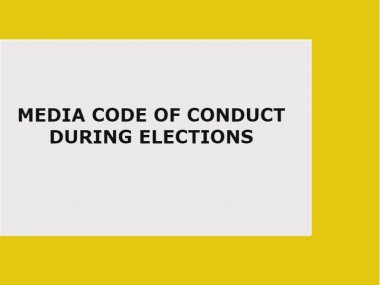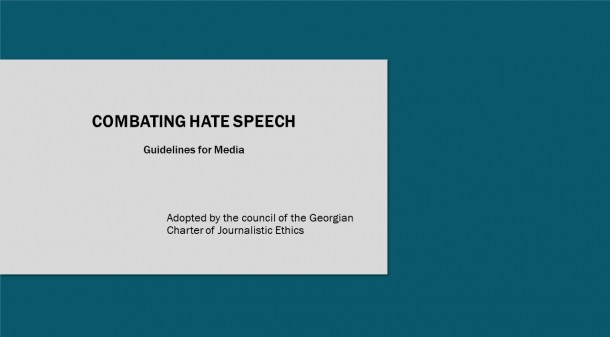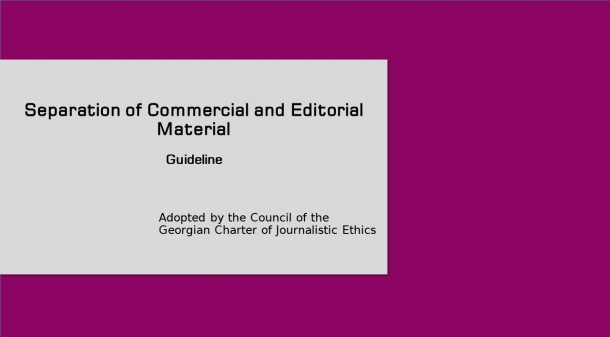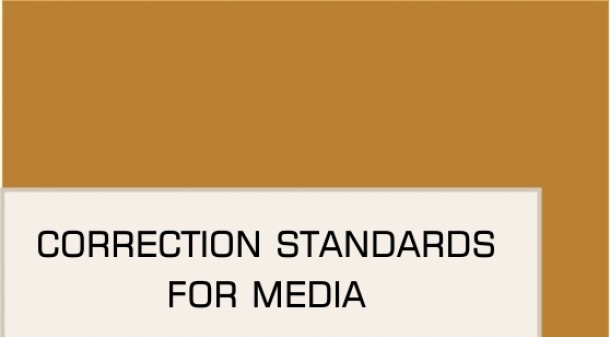“The will of the people shall be
the basis of the authority of government; this will shall be
expressed in periodic and genuine elections…”
(The Universal Declaration of Human
Rights)
We believe that mass media plays a crucial role during elections in providing access for political contestants to communicate their messages and in presenting news about political parties, political leaders and matters of political importance is vital to the integrity of the electoral process. A partisan presentation of facts or omission of important opinions significantly reduces the quality of reporting. An unbalanced news item is not only inaccurate but also biased because it offers a distorted, partisan and confusing view of affairs or issues.
We believe that a political subject should not misuse the media to disseminate false information for the sake of its own promotion. This could seriously undermine public confidence in elections and any government ascending to power using such methods is questionable. Ultimately, this increases division between politicians and citizens who naturally grow skeptical since the loss of confidence in a political entity can make them turn their backs on politics as such.
We believe that while all democratic countries apply slightly different criteria to the behavior of print, broadcast and online media outlets, the basic concepts concerning the quality of journalists’ work are the same. In this respect, it is important to stress the important role of self-regulatory measures by journalists themselves, regardless of the type of the media.
We believe that the public broadcaster has to observe even more rigorous criteria than other media since it belongs to all citizens. Using public media to promote a certain political party or candidate should therefore be considered as an illegitimate manipulation with the public property. Citizens are entitled to insist on fairness, balance and impartiality and make sure that the government’s attitude towards the media will ensure their access to information to which they are entitled.
We believe that while private media’s status is different from that of the public one, they should also provide fair, balanced and unbiased information about election campaigns. Managers and owners of respective media outlets thus take upon themselves a certain amount of responsibility for media broadcasting, resulting from the fact that broadcast frequencies are considered public property serving public needs.
Taking into consideration the above-mentioned principles we, media managers, on behalf of the Georgian media outlets, decided to accept and comply with the principles stipulated by the Media Code of Conduct during Elections, prepared by the Georgian Charter of Journalistic Ethics on the basis of the domestic legislation, international documents and self-regulatory principles.
Media Code of Conduct During Elections
To ensure free and democratic elections as well as to avoid undesirable polarization of the society and to promote good and responsible journalism, , we, the signatory parties, pledge to:
- Accept and comply with the principles of the Code
- Accept the fact that freedom of expression and information are vital for a democratic society and inevitable for its progress and application of other human rights and basic liberties
- Accept provision of completeness of information and plurality of opinions throughout an election campaign
- Accept the fact that identification of all expressions of bias is the hallmark of journalistic professionalism
- Media will observe the principles of journalistic ethics, objectivity and editorial independence.
- Above all, journalists have a committement in front of the public and not in front of state authorities.
- In fact, the authorities shall refrain from interfering in the workings of the media and, when necessary, they shall impose positive measures to promote pluralism of the media and to protect them from attacks and undue pressures.
- The basic principle of ethical thinking about journalism consists in necessity to differentiate bewtween news and opinions. A piece of news is information about facts and data, whereas opinion implies thoughts, ideas, faith or on the part of the companies running the media.
- The principle of freedom of speech implies that journalists, editors, producers and media owners take responsibility for the content and form as well as consequences they entail.
- Media will resist potential outside and inside pressures leading to doctoring or adjusting stories which might favour or disfavour political entities or themselves. Media managers and owners will not exert pressure on their employees to act at variance with these principles.
- A journalist has a right to participate in building a story or refuse to participate therein provided it is at variance with his/her conscience.
- In their election newscasts the media will adopt a balanced and impartial attitude. When offering their broadcast time, they won’t resort to either positive or negative discrimination against any of the candidates or political parties. This obligation also implies that hosts and journalists participating in the process of shaping programs providing news and information will uphold impartiality.
- Balance is a proportionate representation and portrayal of the politically relevant opinions of the parties involved, which are essential for grasping a concrete event or issue in particular situations, thus no party or opinion is offered inappropriate presentation in terms of space, broadcast time or portrayal with respect to its relevance to the problem at hand even in cases in which some of the opinions fail to coincide with those of a journalist working on the story.
- The media will refuse all open or furtive expressions of intolerance and will consider thoughtfully if publication of such expressions is not conducive to defamation and ridicule based on sex, race, color, language, faith and religion, affiliation with national or ethnic minority or ethnic group, social difference, political or other opinion.
- The media serves as a forum for exchange of opinions, public debate, confrontation and criticism, offering the general public a chance to gain a better understanding of opinions presented by individual candidates and political parties. The media accepts that without important facts, no piece of information is complete.
- The media will provide accurate, fair, and undistorted information on election candidates.
- The media will ensure that every piece of news will only contain facts corresponding to reality and whose veracitywill be verified by independent sources quoted therein.
- The media will avoid adjusting data and facts in a manner that would distort reality and in determining the order of importance of the individual pieces of information it will impartially and objectively provide, distinguishing between relevant and irrelevant information.
- The media will not manipulate picture or sound so that the choice of words or other means of expression, change in tone, shift of stress or editing will not deliberately displace the meaning or value of the message.
- In publishing opinion polls the media will present results in an unbiased manner and will publish all the available information, especially that related to the organization conducting the opinion poll, about the size of the characteristic sample of population and the time when the poll was carried out.
- Media will choose criteria for offering time or space to political parties in their politically relevant programmes. If an addressed party refuses to comment on an issue at hand, or all attempts to contact the person fail, it has to be mentioned in the news item.
- Journalists, editors, producers and proprietors will spare no effort to make the distributed information correspond with truth and conscience. The facts should be mediated without any distortions and in their respective contexts. If a flawed message is published it should be followed by an immediate apology.
- The Facts should be presented in the most objective manner and in the right context, without distortions and holding back related information and with an appropriate creativity of journalists.
- News headlines and summaries have to be most pertinent in expressing the essence of published facts and data. If editorial comments are broadcast in news programs it is vital to broadcast opinions of the party that had been referred to.
- The media will be consistent in separating the activities of the incumbent representatives of administration and self-government from the activities they pursue as the representatives of political parties running in the election.






